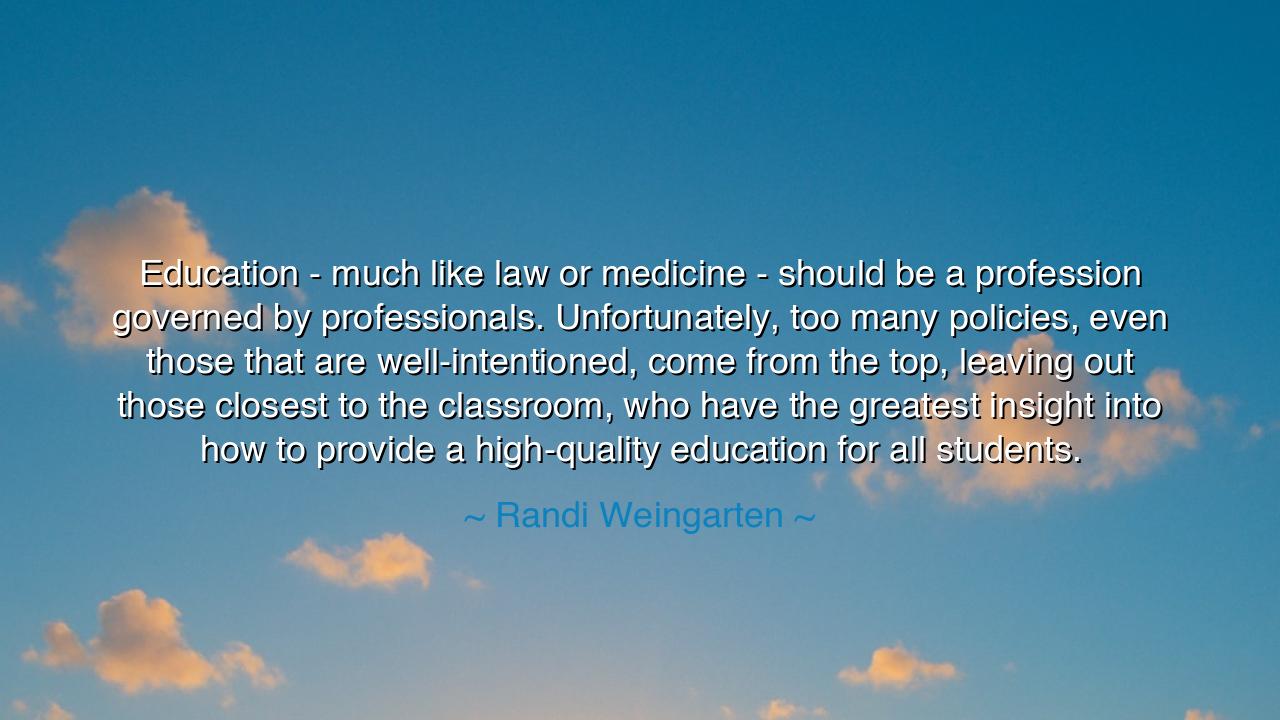
Education - much like law or medicine - should be a profession
Education - much like law or medicine - should be a profession governed by professionals. Unfortunately, too many policies, even those that are well-intentioned, come from the top, leaving out those closest to the classroom, who have the greatest insight into how to provide a high-quality education for all students.






The words of Randi Weingarten carry the force of an ancient truth, one that echoes through every age where wisdom has been traded for bureaucracy. “Education – much like law or medicine – should be a profession governed by professionals.” In this declaration lies both reverence and warning: reverence for the sacred art of teaching, and warning against the arrogance of those who seek to command it from afar. Education, she tells us, is not a mere mechanism of policy—it is a living craft, shaped by those who stand in the presence of learners, who understand the rhythm of hearts and minds. Like the healer who knows the pulse, or the jurist who feels the weight of justice, the teacher holds sacred insight into the human soul.
In ancient Athens, the philosopher Socrates taught not by decree, but by dialogue. He did not wait for policies from the Senate to guide him, nor for rulers to tell him how to teach virtue. He listened to his students, questioned them, challenged them, and in turn, was taught by their responses. His education was not a product of centralized power but of direct communion between wisdom and curiosity. This is the essence of Weingarten’s plea—to restore the voice of the teacher, the artisan of the human mind, to the center of all decision-making.
When Weingarten laments that “too many policies… come from the top, leaving out those closest to the classroom,” she speaks against an age-old error: the belief that leadership without listening can yield understanding. Empires have fallen to this blindness. The great Roman Republic, at its height, flourished because senators once listened to the tribunes—the voices of the people. But when arrogance silenced them, decay began. Likewise, when the voices of teachers are silenced, the vitality of education withers. For a classroom is not governed by laws written on paper, but by relationships, patience, and the delicate art of awakening the sleeping mind.
Consider the story of Maria Montessori, the Italian physician who transformed education by defying rigid systems. At a time when teaching was mechanical and joyless, she entered classrooms filled with poor, forgotten children and listened—to their movements, their silences, their wonder. From that listening was born the Montessori method, now revered worldwide. Her work did not come from the top; it rose from the ground, from the soil of real experience. She, like Weingarten, proved that the deepest insight belongs to those who live the craft, not those who regulate it from ivory towers.
The profession of education, then, must be treated with the same sanctity as medicine or law. Would a surgeon allow a distant official to dictate how to hold a scalpel? Would a judge permit a bureaucrat to write the verdict in his stead? Yet teachers, the surgeons of the soul, are too often commanded by those who have never stood before a restless classroom, never seen the fire of discovery or the weight of despair in a child’s eyes. To deny their expertise is to deny the heartbeat of civilization itself.
For in truth, education is the lifeblood of democracy, the fountain of every freedom and innovation. But when policies are written without the wisdom of teachers, they become brittle and lifeless, like clay molded without water. Weingarten’s words are a call to humility—to remember that those “closest to the classroom” are not mere implementers, but guardians of the future. The teacher’s insight is not to be overseen; it is to be honored.
Therefore, let all who govern take heed: to build strong schools, first listen to the teachers. To craft wise policy, first walk the halls where knowledge breathes. Let every citizen understand that true reform begins not in offices, but in classrooms, not in speeches, but in the quiet labor of educators who give their hearts daily for the minds of others.
And for the teachers, let Weingarten’s words be both comfort and call to courage. Stand firm in your craft. Speak with the authority of experience. You are not mere servants of a system—you are its soul. The world may try to command you from the top, but wisdom always flows upward from the ground. And as long as you teach with integrity and passion, you will remain what the ancients revered most: a keeper of light, guiding humanity through the long night toward a dawn of understanding.






AAdministratorAdministrator
Welcome, honored guests. Please leave a comment, we will respond soon